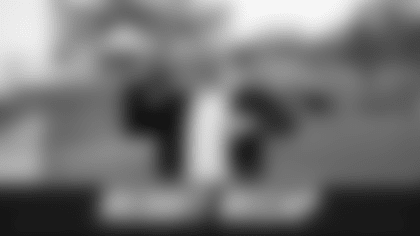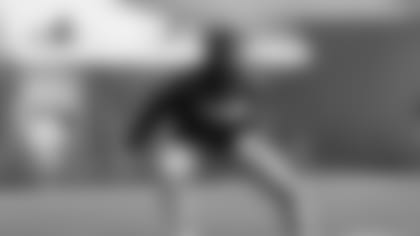*The following appeared first in the 2012 Houston Texans Yearbook, which was released prior to the start of training camp. To check out the photos that accompanied the story, click here. To purchase the yearbook, click here.
A rabid, menacing scowl, with a crimson scrawl fanning out like a river delta down the center of his face. The moments after Texans linebacker Brian Cushing was head-butted by a Cleveland Browns offensive lineman in Week 9 at Reliant Stadium last season encapsulate the controlled rage for which the defensive captain is best known.
Video of the encounter became a borderline Internet sensation.
Photos of it became the favorite images of thousands of Texans fans.
Cushing's maniacal stare and welded-shut lips are incredibly fitting, because his teammates describe the fourth-year defensive star from USC as a player who leads by example, rather than bluster.
"He doesn't do all that talking," safety Danieal Manning said at the conclusion of OTAs (organized team activities).
"He's not necessarily a man of a million words," defensive end J.J. Watt said.
"He's not going to say a whole lot," fellow team captain and quarterback Matt Schaub said.
Cushing more than makes up for the lack of chatter with his play on Sundays and, maybe even more importantly, the work he puts in each week at practice. Cushing finished the 2011 season with a team-best 114 tackles and also chipped in with four sacks, a pair of interceptions and two forced fumbles. His work ethic during the week is one of the things Manning first points to when talking about Cushing.
"He's out here working every day, and that's one way you can do it," Manning said of Cushing's style of leadership. "Just showing a day-to-day grind, every play, wanting to learn."
Learning is a key word when it comes to Cushing, because he, along with his teammates, had to pick up defensive coordinator Wade Phillips' 3-4 scheme on the fly in 2011. The lockout prevented the players from absorbing a playbook during the offseason, so Phillips and company implemented their defense in early August. The results were nothing short of extraordinary, and Phillips pointed Cushing as being a driving force.
"He's the example," Phillips said during OTAs. "He's the guy that plays hard, plays tremendously hard. Has great athletic ability, but uses it."
Phillips famously called Cushing a "holy terror" last season. Because Phillips was learning about the Texans' defensive players as the players were learning about his defense, he was able to utilize Cushing's skillset a bit differently as the year progressed.
"Once we realized how good Cushing was rushing the passer from inside, we did it quite a bit last year, and we got better and better at it," Phillips said.
Cushing's disruptive nature helped serve as a catalyst for the "Bulls on Parade" defense in 2011. At the end of the season, his teammates chose him as the Texans' overall Most Valuable Player.
During the Texans' seven-game winning streak in 2011, Cushing was named a team captain, joining defensive end Antonio Smith and former Texans linebacker DeMeco Ryans as defensive players with a "C" patch on their jerseys. Typically, the week before the first regular-season game is when the Texans name their captains. But Cushing's exceptional play and quiet leadership dictated a need for a slight alteration to the normal procedure.
That captain's patch and the responsibility it carries were not lost on, or taken for granted by, Cushing.
"It's an honor going out there every week and having that on your jersey," Cushing said. "It's just such a different feeling. I don't know what it is, but from not having it and then playing the game and having it, there's an aura about it.
"It's such a responsibility that I want. I upped my mindset and my game more than anything because I wanted to show more than ever to the guys how to do it."
At various points during the 2011 season, head coach Gary Kubiak said Cushing's grasp of the defense, as well as opposing team's tendencies, was advanced to the point of being able to disrupt offensive plays before they could get started. Cushing attributed that to a "lead by example" mantra.
"Game film and being a first-guy-in, last-guy-out kind of guy," Cushing said of his preparation process. "I think if people see that and see that no matter what awards or accolades you get, you don't change and you continue to work the same way, I think that's more important than anything."
Ryans had been a captain since 2007, and his trade to the Philadelphia Eagles this offseason brought rampant media questions about the team's defensive leadership in the near future.
Kubiak said that with Smith and Cushing, along with a sense of family among the entire unit, the defense would withstand the loss of Ryans just fine.
"I think they all look to Cush as a leader," Kubiak said. "Is Brian being asked to be more of a leader since DeMeco is not here? I think that's obvious, yeah."
Watt, as well as nose tackle Earl Mitchell, both cite Cushing's frenetic motions on the field as one of the first things they noticed when playing with the inside linebacker.
"He never slowed down," Watt said. "He was a hundred miles per hour from the left side to the right side, up the middle, going deep. His speed never changed. It was crazy to me to see someone that had that type of energy. He literally just never got tired."
And that energy is contagious, according to Mitchell.
"When you watch him play, you feed off his energy," Mitchell said. "When the play is over with, he's always in the vicinity of the ball. You basically want to mirror that type of play, and you envision yourself doing what he's doing. The coaches are always pointing him out on film."
The bar is set high for Cushing in 2012. Like the rest of his teammates, he aspires to be a Super Bowl champion. He also knows the path he and the defense want to take to help make that happen. Cushing said it's simple: Go from being the second-ranked defense in 2011 to being the best for years to come.
"The sky's the limit," Cushing said. "There's obviously always room for improvement. As far as physically, I'm going to continue to improve. I'm probably just entering the peak of my career. If I combine a better mental game with what I can do physically, then every single year I can continue to get better."















